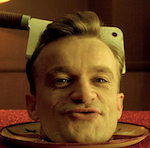 “Just like you said, the wind’s shifting. Everyone’s gonna get it.”
“Just like you said, the wind’s shifting. Everyone’s gonna get it.”
 At the 65th Academy Awards, the Best Foreign Language Film Oscar went to a French film – the historical drama INDOCHINE. I’m sure it was great, but people like me didn’t know to pay attention to movies like that. We paid attention to the French film that we heard was really cool looking and darkly funny and had something to do with cannibalism. That was DELICATESSEN, the feature debut of directors Jean-Pierre Jeunet & Marc Caro, which Miramax released in the U.S. on April 3, 1992, a year after it came out in France.
At the 65th Academy Awards, the Best Foreign Language Film Oscar went to a French film – the historical drama INDOCHINE. I’m sure it was great, but people like me didn’t know to pay attention to movies like that. We paid attention to the French film that we heard was really cool looking and darkly funny and had something to do with cannibalism. That was DELICATESSEN, the feature debut of directors Jean-Pierre Jeunet & Marc Caro, which Miramax released in the U.S. on April 3, 1992, a year after it came out in France.
I don’t know how many screens it played on, because it didn’t make enough to show up on the box office charts, but I think it traveled around for a while. I remember seeing ads for it at the arthouse theaters – it was a much discussed cult movie of its time. Since this is maybe the most interesting of the April releases that kept playing into the summer it seemed like the best way to kick off this 1992 – Weird Summer series.
I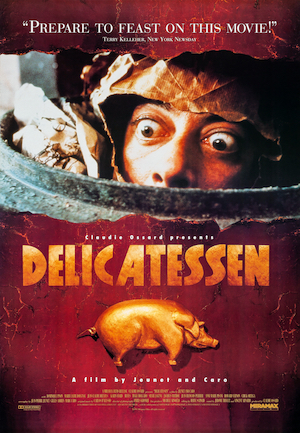 think this was my first revisit since the mid-‘90s. Though I remembered it “had something to do with cannibalism” I forgot that the bulging eyes on the poster belong to a man (Pascal Benezech) attempting to escape being eaten. He makes himself a suit out of garbage (as one does) and tries to be taken out with the trash, but it doesn’t work – the butcher Clapet (Jean-Claude Dreyfus, DOG DAY) swings his cleaver at him right before the title comes up. Clapet seems to own the apartment building above his shop, and immediately after the credits the tenants jockey to trade him small bags of grain and legumes for this fresh human meat.
think this was my first revisit since the mid-‘90s. Though I remembered it “had something to do with cannibalism” I forgot that the bulging eyes on the poster belong to a man (Pascal Benezech) attempting to escape being eaten. He makes himself a suit out of garbage (as one does) and tries to be taken out with the trash, but it doesn’t work – the butcher Clapet (Jean-Claude Dreyfus, DOG DAY) swings his cleaver at him right before the title comes up. Clapet seems to own the apartment building above his shop, and immediately after the credits the tenants jockey to trade him small bags of grain and legumes for this fresh human meat.
Our protagonist, Louison (Dominique Pinon, THE RETURN OF MARTIN GUERRE) is the next guy intended for the same fate, a former clown who responds to an ad offering room and board to a handyman. He moves in and starts working, having no idea that all his neighbors expect to eat him eventually. This gets more complicated when some of them realize they like him.
Most on Louison’s side is Clapet’s own daughter Julie (Marie-Laure Dougnac), who quickly gets a crush on him. It’s funny, we now think of Jeunet as an aggressively whimsical director, but back then I think I got thrown off by the dark humor and setting. I forgot how much of this thing is cute shtick, including a really funny scene where Julie is alone practicing how to smile and sit and walk across the apartment with her glasses off when Louison comes over for tea. He doesn’t know she can’t see so he doesn’t know that she doesn’t know she’s spilling tea all over the place.
One of the goofiest and most memorable scenes involves Clapet having sex with his way-out-of-his-league girlfriend Mademoiselle Plusse (Karin Viard). The squeaking of a spring in the mattress echoes through the pipes of the buildings and subconsciously changes the rhythm of what everyone is doing: Louison painting a ceiling, Julie playing cello, others hitting a rug to knock the dirt off, pumping a bicycle tire, drilling holes, knitting. As the speed of the sex increases so does that of the other activities, and as Clapet orgasms Louison falls, a cello string snaps, the bike tire pops, etc. A nice little comedic set piece that shows how intertwined the lives and fates of the people in this building are.
Julie and Louison’s relationship really picks up when he brings over his musical saw (which he used to play in an act with his chimp partner Mr. Livingstone) and duets with her. There’s something beautiful about people being able to share these nice moments together despite living in such a dystopia. I hope that’s true. We’ll find out soon, I’m sure!
As the girlfriend of the evil butcher you’d think Mademoiselle Plusse would be a jerk, but she’s maybe my favorite character. She calls Louison over to try to fix the squeaking mattress spring, and she says, “This is an antique. It’s seen alot of use.” I love the contrast of this provocative comment with the complete innocence of the situation. It doesn’t seem like she’s flirting with him or that he’s uncomfortable sitting on her bed with her. He seems too focused on doing the job to think about it. They sit next to each other and slowly bounce – he intently listens and very seriously leads her in leaning in different directions to test it. It plays almost like a dance sequence.
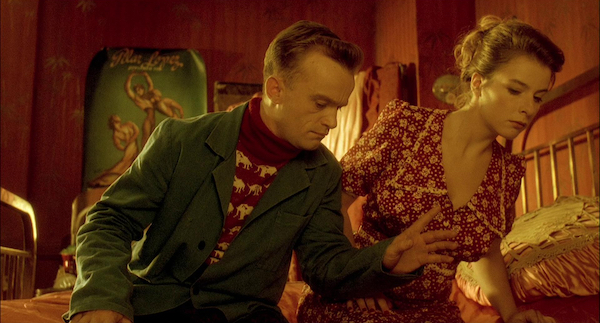
I expected Clapet to walk in and get the wrong idea. Instead that sort of scenario happens later with Julie finding Louison and Mademoiselle dancing together. I love it because it’s such a silly thing to be caught doing and feel guilty about – she’s shaking maracas and he’s dancing around with a fake third leg playing a tiny ukelele. But Mademoiselle especially looks so genuinely joyful, and to Julie it seems like a violation that Louison is sharing his act with someone – especially her hot step-mom! – before her. Something more intimate than sex in the world of this movie.
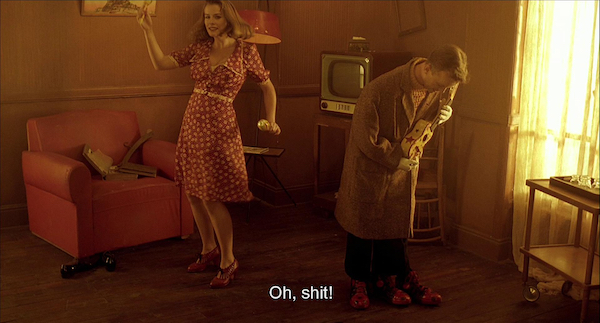
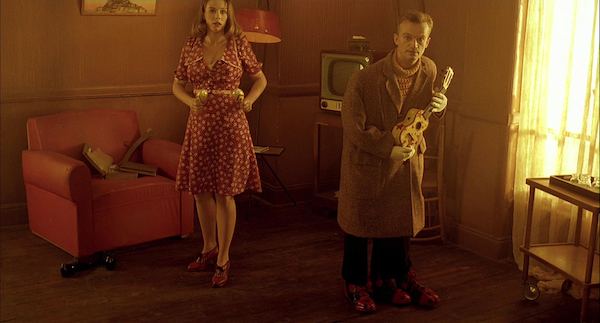
What Julie doesn’t know is that Mademoiselle was originally looking for her, to tell her how much her father wants her to forgive him, but she stopped to tell Louison that his act was going to be on TV. She sees Julie upset, immediately feels terrible and tries to go talk to her about it – the thing you should do in these situations that people usually don’t do in movies and TV.
Anyway Julie forgives Louison and goes down in the sewers to convince a literally and figuratively underground army of vegetarian rebels called the Troglodists to rescue him before he gets eaten. So it’s a romance. Also I should mention that Louison has a cool knife called “The Australian” that he knows how to throw like a boomerang.
The melding of that Jeunet whimsy with a world of awfulness gives this a really unique flavor. I almost called it juxtaposition, but I don’t think that’s quite right. There’s no irony to it. To me the movie seems not to mock but to glorify this clown and his positive attitude, even if it comes more out of cluelessness than optimism.
Jeunet & Caro also combine the cute with the absolutely grim. A neighbor lady named Aurore (Silvie Laguna) keeps trying to commit suicide via fanciful Rube Goldberg contraptions, only to be accidentally foiled. She asks a poor schmo who’s in love with her to come over – a way to get him to ring her doorbell, causing a sewing machine to stitch a strip of fabric which will pull a lamp off a ledge into her bath tub. The lamp unplugs just in time to spare her life, thanks to vibrations caused by Louison trying to repair the squeaky spring. Once again that mattress affecting other people in the building.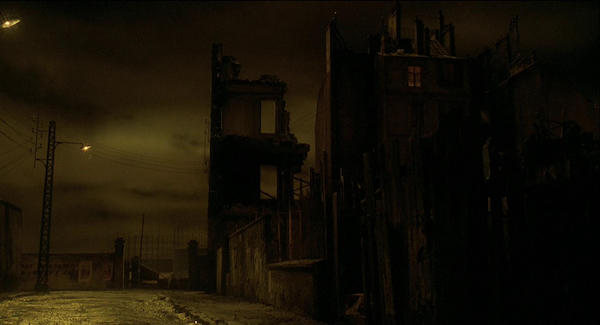
It’s a unique approach to a post-apocalypse. We mostly know it’s one because of some cool model shots of wrecked buildings. Otherwise it could just be a depression, or a drought. The situation is horrible – I mean, that’s obvious. People have turned to cannibalism. Some people think the crops will start growing back, but Clapet thinks that’s naive. The darkest joke about it all is the guy who tries to offer a “rat call” as a valuable item. A thing that makes a sound that attracts rats, presumably so you can catch them for meat. The punchline is that it’s worthless because there are no rats left.
And yet we still have civilization. Apartments. Shops. Taxis. Jobs. Garbage trucks! There’s even a newspaper being published (though it’s called Harsh Times), and TV stations broadcasting. Compared to any MAD MAX sequel or similar, things aren’t that bad. The couple in WHEN THE WIND BLOWS wouldn’t notice anything was off. I think this somewhat civilized wasteland adds a nice layer of satire to the proceedings. Being less removed from life today, they seem more like us. And if they’re like us then apparently we would be willing to sacrifice the “don’t kill a guy for meat” part of our morals in exchange for survival and a relatively comfortable lifestyle.
That’s where everybody in this apartment is at when the movie starts. Seemingly nice people who nevertheless were willing to eat that failed garbage escaper, and are ready to do it again with Louison. Absolutely savage. But it’s Louison’s personality, and Julie’s fondness for him, that changes things. Even Clapet gets a soft spot for him, says “He’s not a bad guy,” admits he feels bad about his previous kills, who he even refers to as his victims.
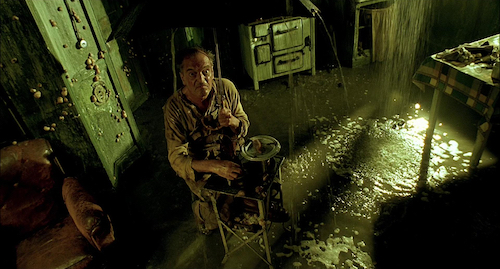 It can’t be underestimated how important the visuals were to the success of this movie. The popular comparison was to the films of Terry Gilliam, who in fact lent his name as a presenter for the North American release. It has an eerie jaundiced tint to the lighting (more unusual in the analog days than it is now), and atmospheric fog that obscures most of what lies beyond the building. The movement of the camera sometimes illustrates the geography of the world, for example it floats into a stove and through the pipes following sounds to show us that they carry to other apartments. But the angles and movements get even more stylized during a nightmare sequence that reminds me of a Sam Raimi movie. This is the third film by cinematographer Darius Khondji, in my opinion one of the greats of his era. He went on to shoot more of Jeunet’s movies as well as SE7EN, STEALING BEAUTY, EVITA, OKJA and UNCUT GEMS.
It can’t be underestimated how important the visuals were to the success of this movie. The popular comparison was to the films of Terry Gilliam, who in fact lent his name as a presenter for the North American release. It has an eerie jaundiced tint to the lighting (more unusual in the analog days than it is now), and atmospheric fog that obscures most of what lies beyond the building. The movement of the camera sometimes illustrates the geography of the world, for example it floats into a stove and through the pipes following sounds to show us that they carry to other apartments. But the angles and movements get even more stylized during a nightmare sequence that reminds me of a Sam Raimi movie. This is the third film by cinematographer Darius Khondji, in my opinion one of the greats of his era. He went on to shoot more of Jeunet’s movies as well as SE7EN, STEALING BEAUTY, EVITA, OKJA and UNCUT GEMS.
Caro is credited as the production designer, and reportedly concentrated on the visual side of directing while Jeunet worked with the actors. The art director is Milijen Kreka Klijakovic (production designer of TIME OF THE GYPSIES, ARIZONA DREAM, UNDERGROUND, THE BRAVE and, uh, SPECIES II).
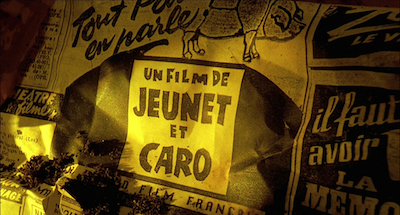 By the way, when was the last time you saw a really great credit sequence? Kind of a lost art, I’d say. You see a lovingly crafted one like this and you know these people really give a shit about making the best movie they can. They want every little detail to be great, even the details you can get away with ignoring. No time for that these days. At best they get the computer guys to do some fancy motion graphic credits to show at the end while most people are leaving.
By the way, when was the last time you saw a really great credit sequence? Kind of a lost art, I’d say. You see a lovingly crafted one like this and you know these people really give a shit about making the best movie they can. They want every little detail to be great, even the details you can get away with ignoring. No time for that these days. At best they get the computer guys to do some fancy motion graphic credits to show at the end while most people are leaving.
There’s a thing I don’t understand where certain people get mad at directors who make great looking movies. I guess they think if it has style that means it has no substance, or they think it’s a cheat to use the visual part of a visual medium, or they’re just really proud of themselves for noticing an artist has a distinct style that they can recognize in more than one movie and they’re like “AH HA! I CAUGHT YOU! NOW YOU MUST BE PUNISHED!“
Personally I find this attitude confounding and even sacreligious as a movie worshiper. I love directors who put great care into making every little thing on screen pleasing to the eye. I appreciate Jeunet & Caro (and later Jeunet minus Caro) for making movies where every set, every prop, every piece of clothing, every textured surface is either created or curated to be just right for this world that exists only on screen. And come to think of it, the faces and bodies of their actors always fit perfectly into that world too. (Casting by Pierre-Jacques Benichou, DOBERMANN, THE CRIMSON RIVERS, THE ASSAULT.)
Like Gilliam or Tim Burton, Jeunet and Caro had a background in animation before settling into live action features. They met at the Annecy Animation Festival in the ’70s and directed stop motion shorts together in 1978 and 1980. In 1981 they made the 23 minute live action short Bunker of the Last Gunshots, set in a post-apocalyptic world similar to DELICATESSEN’s. They also made a number of commercials and music videos, both together and apart, where I suspect they perfected the look and feel of DELICATESSEN, which feels so assured for first timers.
A few years after receiving world wide attention during Weird Summer, the Jeunet & Caro team reached their peak with the dark fantasy THE CITY OF LOST CHILDREN (1995), which really got the attention of Hollywood and broke up the team. Jeunet couldn’t resist the opportunity to direct a big franchise film, but Caro wasn’t interested in the sellout/compromise thing, so he provided some designs and then hit the road. Jeunet continued his solo act, with his biggest success being AMELIE (2001). This year he returned after a long absence with the straight to Netflix jam BIGBUG. Caro has directed one feature on his own, the 2008 sci-fi film DANTE 01.
important note: Marie-Laure Dougnac, who played Julie, does alot of French dubbing for American films, including as the voice of Parker Posey’s character Danica Talos in BLADE: TRINITY.


























May 13th, 2022 at 3:40 pm
What a great introduction to your “1992: Weird Summer” series. I haven’t seen this movie since maybe 2003 or 2004. A rewatch is due (plus getting around to watch BIGBUG on my Netflix queue).
Great review!